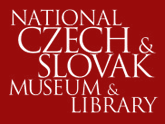Written by NCSML intern Laura Hayes
Black Europeans, African Americans, and 20th Century Histories
In the Introduction to his famous anthology of poetry and essays titled The New Negro: An Interpretation, Alain Locke compares Harlem’s importance to Black Americans in the 1920s to Prague’s importance in the newly formed Czechoslovakia. That is, both were centers of culture, self-expression, and freedom. Because of the tumultuous political histories of Czechs and Slavs in Europe and African Americans in the United States in the early 20th century, the conclusion of WWI opened new opportunities to each population. In Harlem it was an artistic and literary renaissance for Black artists, and in Prague it was peaceful resistance that resulted in independence.

Laura is a sixth year PhD candidate at the University of Iowa where she studies 19th century literature, and teaches literature and writing.
But centuries before Alain Locke compared the oppression of African Americans in the United States to the political oppression of Czechs before their independence, significant African populations existed across Europe because of the European slave trade. (Voluntary migration as with some of the more recent authors on this list also contributed and contributes to African populations in European countries, but for centuries voluntary migration was not the primary or largest form of migration.) While the largest European countries involved in the slave trade were England, Spain, Portugal, France, the Netherlands, and Denmark, other countries such as Ireland, Italy, Germany, Poland, and Russia all had their own histories of African slave trading and mistreating African people that have resulted in large Afro-European populations who still experience discrimination.
Below is a reading list that offers various perspectives on the African Diaspora in Europe due to European and American slave trades. It begins with Congolese-Czech novelist Tomas Zmeskal and includes other first-person accounts from Afro-European and Black American writers who are currently writing about the lasting effects and discrimination of forced migration and slavery in Europe and the United States. The list then looks more broadly at the history of the Diaspora across the Atlantic and how the history of slave trading created our modern world and our modern prejudices. It particularly considers African histories from African perspectives as an attempt to diversify and broaden the European histories we are familiar with. Because Germany had its own unique politics around Afro-Germans during WWII, it has a category of its own. Finally, the list includes, and concludes with, African Americans writing about the African Diaspora and resulting Black experiences in the United States and the United Kingdom. This section also addresses Black Americans relationships to communism in the 20th century, for which they looked to Central and Eastern Europe. Put together, this list is a snapshot of the ways that the forced migration of Africans through centuries of European slave trading created the people and the politics and the prejudices at work all around us.
Sources Referenced:
Klein, Herbert S. The Atlantic Slave Trade. Cambridge UP, 2012.
Locke, Alain Eds. The New Negro: An Interpretation. Albert and Charles Boni, 1925.
“The African Diaspora in Europe,” Institute for Cultural Diplomacy. culturaldiplomacy.org
Reading List
Czech Novels:
Love Letter in Cuneiform Script by Tomas Zmeskal
The Biography of the Black and White Lamb Tomas Zmeskal
Biography, Autobiography, and Memoir:
Black Bolshevik: Autobiography of an Afro-American Communist by Harry Haywood
Paul Robeson: The Artist as Revolutionary by Gerald Horne
I Wonder as I wander: An Autobiographical Journey by Langston Hughes
Destined to Witness: Growing up Black in Nazi Germany by Hans Jürgen Massaquoi
Afropean: Notes from Black Europe by Johny Pitts
Black on Red: My 44 years inside the Soviet Union by Robert Robinson
Black Man in Red Russia: A Memoir by Homer Smith
Sedm let v Africe or Seven Years in Africa Obonete Ubam
Atlantic and European Black Histories:
Pan Africanism and Communism: The Communist International, Africa and the Diaspora, 1919 –1939 by Hakim Adi
Beyond the Color Line and the Iron Curtain: Reading Encounters Between Black and Red, 1922-1963 by Kate A. Baldwin
Nationalism, Marxism, and African American Literature Between the Wars by Anthony Dawahare
The Black Atlantic: Modernity and Double Consciousness by Paul Gilroy
The Practice of Diaspora: Literature, Translation, and the Rise of Black Internationalism by Brent Hayes Edwards
Encyclopedia of Blacks in European History and Culture by Eric Martone
Africa’s Discovery of Europe by David Northrup
Black Europe and the African Diaspora Eds. Darlene Clark Hine, Trica Danielle Keaton, and Stephen Small
20 Questions and Answers on Black Europe by Stephen Small
Afro-German Histories
A Breath of Freedom: The Civil Rights Struggle, African American GIs, and Germany by Maria Höhn and Martin Klimke
Germany and the Black Diaspora Points of Contact 1250 – 1914 Eds. Mischa Honeck, Martin Klimke, Anne Kuhlmann
Remapping Black Germany: New Perspectives on Afro-German History, Politics, and Culture Ed. Sara Lennox
Hitler’s Black Victims: The Historical Experiences of Afro-Germans, European Blacks, Africans, and African Americans in the Nazi Era by Clarence Lusane
Not so Plain as Black and White: Afro-German Culture and History, 1890 – 2000 by Theodor Michael
Black Germany: The Making and Unmaking of a Diaspora Community, 1884 – 1960 by Eve Rosenhaft and Robbie John Macvicar Aitken
International African American Histories and Communism
Left of Karl Marx: The Political Life of Communist Claudia Jones by Carole Boyce Davies
The World and Africa and Color and Democracy by W. E. B. Du Bois
Radicalism at the Crossroads: African American Women Activists in the Cold War by Dayo F. Gore
Black Revolutionary: William Patterson and the Globalization of the African American Freedom Struggle by Gerald Horne
The New Negro: An Interpretation by Alain Locke
In the Cause of Freedom: Radical Black Internationalism from Harlem to London 1917-1939 by Minkah Makalani
Blacks and Reds: Race and Class in Conflict 1919-1990 by Earl Ofari Hutchinson
The Cry was Unity: Communists and African Americans 1917 – 1936 by Mark Solomon
Categories
- Activities (7)
- Advocacy (6)
- BrewNost (4)
- Current Events (12)
- Education (16)
- Exhibit News (11)
- From Our Museum Staff (98)
- Heritage Garden (10)
- History (13)
- Lesson Plans (1)
- Library (3)
- News (92)
- Oral Histories (1)
- Social (47)
- Store (4)
- Uncategorized (75)
- wedding (2)
Archives
- April 2024
- February 2024
- November 2023
- July 2023
- June 2023
- January 2023
- October 2022
- June 2022
- March 2022
- January 2022
- November 2021
- June 2021
- March 2021
- February 2021
- November 2020
- October 2020
- September 2020
- August 2020
- July 2020
- June 2020
- May 2020
- April 2020
- March 2020
- February 2020
- January 2020
- November 2019
- October 2019
- September 2019
- August 2019
- July 2019
- June 2019
- May 2019
- April 2019
- March 2019
- February 2019
- January 2019
- December 2018
- November 2018
- October 2018
- September 2018
- August 2018
- July 2018
- June 2018
- May 2018
- April 2018
- March 2018
- February 2018
- January 2018
- November 2017
- October 2017
- September 2017
- August 2017
- July 2017
- June 2017
- May 2017
- April 2017
- March 2017
- February 2017
- January 2017
- December 2016
- November 2016
- October 2016
- September 2016
- August 2016
- July 2016
- June 2016
- May 2016
- April 2016
- March 2016
- December 2015
- November 2015
- September 2015
- August 2015
- July 2015
- March 2015
- February 2015
- January 2015

